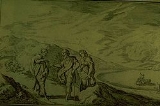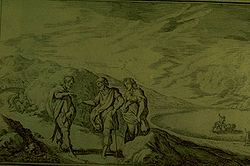
Mestra
Encyclopedia

Greek mythology
Greek mythology is the body of myths and legends belonging to the ancient Greeks, concerning their gods and heroes, the nature of the world, and the origins and significance of their own cult and ritual practices. They were a part of religion in ancient Greece...
, Mestra (Ancient Greek
Ancient Greek
Ancient Greek is the stage of the Greek language in the periods spanning the times c. 9th–6th centuries BC, , c. 5th–4th centuries BC , and the c. 3rd century BC – 6th century AD of ancient Greece and the ancient world; being predated in the 2nd millennium BC by Mycenaean Greek...
: , Mēstra) She is also occasionally referred to as Mnestra in modern sources, though the form is not anciently attested; cf. Clytemnestra
Clytemnestra
Clytemnestra or Clytaemnestra , in ancient Greek legend, was the wife of Agamemnon, king of the Ancient Greek kingdom of Mycenae or Argos. In the Oresteia by Aeschylus, she was a femme fatale who murdered her husband, Agamemnon – said by Euripides to be her second husband – and the Trojan princess...
, whose name does appear with and without the n in ancient authors. The pseudo-Apollodoran Bibliotheca
Bibliotheca (Pseudo-Apollodorus)
The Bibliotheca , in three books, provides a comprehensive summary of traditional Greek mythology and heroic legends, "the most valuable mythographical work that has come down from ancient times," Aubrey Diller observed, whose "stultifying purpose" was neatly expressed in the epigram noted by...
(2.1.5) uses the form Mnestra for one of Danaus
Danaus
In Greek mythology Danaus, or Danaos , was the twin brother of Aegyptus and son of Achiroe and Belus, a mythical king of Egypt. The myth of Danaus is a foundation legend of Argos, one of the foremost Mycenaean cities of the Peloponnesus...
' daughters who marries and then murders Aegius, son of Aegyptus
Aegyptus
- Aegyptus, King of Egypt and Arabia :In Greek mythology, Aegyptus is a descendant of the heifer maiden, Io, and the river-god Nilus, and was a king in Egypt. Aegyptos was the son of Belus and Achiroe, a naiad daughter of Nile. Aegyptus fathered fifty sons, who were all but one murdered by the...
. was a daughter of Erysichthon
Erysichthon
In Greek mythology, Erysichthon can refer to two different personages:-Erysichthon of Thessaly:...
, King of Thessaly
Thessaly
Thessaly is a traditional geographical region and an administrative region of Greece, comprising most of the ancient region of the same name. Before the Greek Dark Ages, Thessaly was known as Aeolia, and appears thus in Homer's Odyssey....
. She had the ability to change her shape at will, a gift of her lover Poseidon
Poseidon
Poseidon was the god of the sea, and, as "Earth-Shaker," of the earthquakes in Greek mythology. The name of the sea-god Nethuns in Etruscan was adopted in Latin for Neptune in Roman mythology: both were sea gods analogous to Poseidon...
according to Ovid
Ovid
Publius Ovidius Naso , known as Ovid in the English-speaking world, was a Roman poet who is best known as the author of the three major collections of erotic poetry: Heroides, Amores, and Ars Amatoria...
. Her father exploited this gift in order to sate the insatiable hunger with which he had been cursed by Demeter
Demeter
In Greek mythology, Demeter is the goddess of the harvest, who presided over grains, the fertility of the earth, and the seasons . Her common surnames are Sito as the giver of food or corn/grain and Thesmophoros as a mark of the civilized existence of agricultural society...
for violating a grove sacred to the goddess. Erysichthon would repeatedly sell Mestra to suitors for the bride-prices they would pay, only to have the girl return home to her father in the form of various animals.

